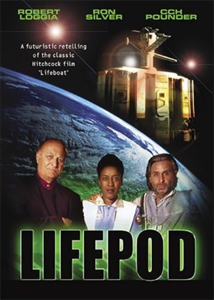The very definition of a remake worth doing, the Fox TV movie “Lifepod” (1993) takes the core concept of “Lifeboat” (1944) but puts new (and in my opinion, improved) twists on the themes and narrative. Interestingly, Alfred Hitchcock gets a story credit here, whereas he didn’t in the credits of “Lifeboat.” (Often, he helped shape stories, but didn’t take official credit.)
I’m in the minority in finding “Lifeboat” to be one of Hitch’s weaker films; it strikes me as nine mostly unlikable people bickering on the Atlantic, and the claustrophobia is evocative in a sea-sickening way.
It’s fascinating to discuss, though, because it was an early film in the era when Nazis had revealed their evil to the world and therefore could be cinematic villains. Hitchcock portrays the Nazi on the boat as having human traits, and he was ripped for it. (Unfairly, he gets it both coming and going, because I felt the evilness of the Nazi is rather blunt.)

“Lifepod” (1993)
Director: Ron Silver
Writers: Jay Roach (teleplay); Pen Densham (teleplay, story); Alfred Hitchcock, Harry Sylvester (story)
Stars: Robert Loggia, Jessica Tuck, Kelli Williams
Set in the future when colonization and mining of our solar system has begun, “Lifepod” – set around Chriss (Christmas) — has some Philip K. Dickian traits in that the future’s politics are the same as our present, just with better technology.
The politics win out over the potential of the tech, so the lifepod’s value is weakened by not being properly stocked or checked out. It seems the operators of the sabotaged spaceship merely wanted people to be comforted by the raw fact of the pods’ existence.
Movie puts its money into the cast
Writers Jay Roach and Pen Densham smoothly pepper world-building and character traits into the dialog, and we learn that EarthCorp is a domineering state, particularly over the underground miners on Venus.
Rena (Kelli Williams, “The Practice”) is basically a slave from that bedraggled Venusian colony, and little person Q-Three (Ed Gale) is a “toolie” who purposely had his left arm replaced with a tool-laden arm. It’s worth more than he is, he openly admits. I had heard of Williams, but not of Gale, and that’s how this whole cast is: a mix of knowns and unknowns, but with everyone on board.
Also from the known camp are Robert Loggia as government official Banks (who has had his vocal cords enhanced to project authority, another of the film’s neat SF touches); CCH Pounder (“Psycho IV”) as Mayvene, the pod pilot who is blocked off from the rest of the group due to a malfunction in the linking corridor; and Ron Silver, who also directs, as blind man Terman.

The parallel to “Lifeboat’s” Tallulah Bankhead is Claire (Jessica Tuck, “Judging Amy”), openly sexual but – unlike Bankhead’s character – she is surrounded by competing strong personalities, making the interactions spark. Also unlike her “Lifeboat” counterpart, she keeps her journalistic equipment rather than losing it overboard — in this case a camcorder. Her recordings play into the “Who blew up the spaceship?” mystery in a clever way, leading to an ending that’s more intense than “Lifeboat’s.”
This Fox TV production clearly spent its money on the cast, which is the right decision. The space special effects are weak, and the set design is at the level of a top-shelf Sci-Fi Channel show of the era, but that’s fine. The size of Hitchcock’s boat seemed to change for the needs of the moment, leading to the queasy feeling.
A black-box theater in space
The lifepod is the right amount of cramped for this black-box-theater type of movie to play out. Certainly, there is plenty of movement; Parker (Stan Shaw), wounded in the leg by a mini meteorite shooting through the hull, needs occasional frantic attention. The expected future-tech things go wrong. But a lot of the clashes come from talking, and that’s fine when the cast is this good.
Also, when Claire hits it off with Kane (Adam Storke), a convict who is artificially calmed by a wrist-mounted device that lessens his brain’s anger impulses, they can have a smidgen of privacy. There’s even a restroom on the pod. So we don’t get the weirdness of the relationship-forming in “Lifeboat.”
The class conflict remains, and we can tell the central government (EarthCorp) has defined the haves and have-nots. You can get into one category or another by rocking the boat or not rocking it. Not made with eagle-eyed censors to placate (on thematic grounds), “Lifepod” – instead of exploring “good” and “evil” nations – is free to put nuance into its characters.
One will be revealed as the villain at the end, but until then, “Lifepod” is a classic story of people from different walks of life being forced to work together in a survival situation.
While “Lifepod” doesn’t make statements we haven’t heard elsewhere (the master-slave dichotomy is common in PKD’s vision of future corporation/governments), this is a quality piece of science fiction. Only the mid- to low-grade special effects paint it as a TV movie rather than a theatrical release. It deserves more attention, so I’ll give it some here: It’s one of the few remakes of a Hitchcock film that’s better than the original.
RFMC’s Alfred Hitchcock series reviews works by the Master of Suspense, plus remakes and source material. Click here to visit our Hitchcock Zone.

